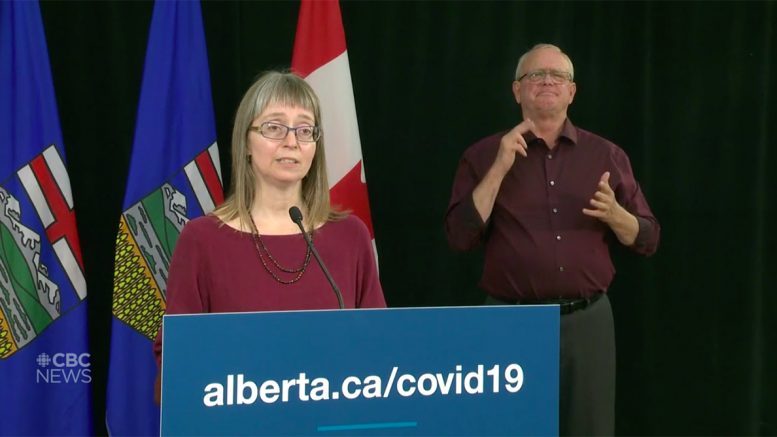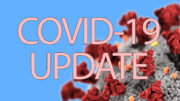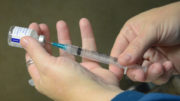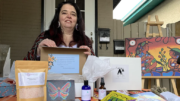by Jake Cardinal, Local Journalism Initiative Reporter
(ANNews) – The New Year marks the rollout of COVID-19 vaccines into Alberta. During the week of Dec. 21, Alberta received shipments of vaccines from Pfizer at dedicated vaccine sites across the province.
The Pfizer vaccine needs to be kept in frigid temperatures and the ultra-cold freezers needed are now installed at eight locations across Alberta. Because of the conditions necessary for the vaccine’s success, immunization will take place at specific delivery sites.
Initial doses will be provided to respiratory therapists, intensive care unit physicians and staff, and eligible long-term care and designated supportive living workers.
Tyler Shandro, Minister of Health said, “This welcome news brings much-needed hope to Albertans, particularly health care workers, during this incredibly trying time in the pandemic. These staff are exhausted, and I hope seeing more vaccinations are on the way will show them there’s an end in sight.”
“Albertans can be confident this vaccine is safe and will be administered quickly and efficiently.”
The Moderna vaccine has also been approved by Health Canada and will be instrumental in getting First Nations and isolated areas immunized as the Moderna vaccine does not require specialized freezer units. This means that it can be distributed to isolated and remote Indigenous communities, including communities in the territories.
This distribution will enable vaccine access in particular to the territories, in Inuit Nunangat, and to vulnerable, remote and isolated Indigenous Nations.
Indigenous Services Canada (ISC), stated in a COVID update that “The logistics of a COVID-19 vaccine requires significant coordination amongst partners. That is why ISC is working closely with Indigenous, provincial and territorial partners to ensure an integrated, coordinated and co-developed approach supporting access to a COVID-19 vaccine by Indigenous Peoples and communities.”
Premier Jason Kenney said that Alberta received the first shipment of the Moderna vaccine on Dec. 29. The initial 16,900 doses were to be sent to long-term care facilities in Edmonton, Calgary, Medicine Hat, Lethbridge, Grande Prairie, St. Paul, Fort Saskatchewan and six congregate living facilities on First Nations.
Siksika First Nation, which is about 100 kilometres east of Calgary, has already received doses of Moderna and administered injections on New Year’s Day.
“We are pleased to see that a safe and effective vaccine has been developed so quickly and made available to our most vulnerable nation members and their care providers,” said Nioksskaistamik Ouray Crowfoot, chief of Siksika First Nation.
“Our health services continue to plan for a staged roll-out of additional vaccine to other priority groups in the near future.”
There are an estimated 7,500 people living on-reserve in Siksika and as of December 29, the reserve had 12 active cases – which makes a total of 323 reported cases. Right now, Siksika’s current transmission risk is “red” (high risk).
January marks Phase 1 of Alberta’s vaccination plan and will focus on priority populations, which includes residents of long-term care and designated supportive living facilities, followed by seniors aged 75 and over and First Nations on reserve, Inuit and on-settlement Metis individuals aged 65 and over.
Phase 2 is still expected to start by April 2021 and will be targeted to the next groups of prioritized populations. Final decisions regarding eligibility in Phase 2 have not yet been determined.
Phase 3 will involve rolling out vaccinations to the general Alberta population, and is anticipated to start later in 2021.
On Dec. 29, Dr. Deena Hinshaw, Chief Medical Officer of Health said, “I am very pleased to hear that we will be able to immunize more of our front-line health-care workers and vulnerable Albertans before the end of the year.”
“But this is not the end. We must continue to follow health measures to bend the curve, and until enough of us are immunized, we must continue to be each other’s vaccine.”
As for COVID-19 statistics within First Nations, as of December 30, Indigenous Services Canada (ISC) is aware of:
- 8493 confirmed positive COVID-19
- 3039 active cases
- 5373 recovered cases
- 81 deaths
During the week of December 20-26, the number of new cases reported did not exceed the number of new cases in the preceding week. ISC has recently observed a reduction in the number of newly reported cases of COVID-19 in First Nations communities with 600 new cases reported during the week of December 20-26 down from 1,219 new cases reported during the week of December 6-12.
Jake Cardinal is a Local Journalism Initiative Reporter for Alberta Native News.







Be the first to comment on "COVID-19 vaccine rollout in Alberta is slow but will pickup as new shipments arrive"